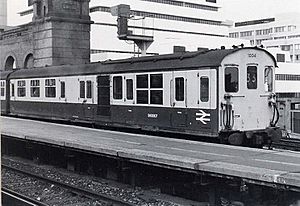British Rail Class 201 facts for kids
Quick facts for kids British Rail Class 201 |
|
|---|---|

Set 1004 prepares to leave Cannon Street station on 14 May 1984
|
|
| In service | 1957–1986 |
| Manufacturer | Eastleigh and Ashford Works |
| Number built | unknown |
| Formation | Unknown |
| Operator(s) | British Rail |
| Specifications | |
| Maximum speed | 75 mph (121 km/h) |
| Weight | 55 long tons (56 t) |
| Prime mover(s) | English Electric 4-cylinder type 4SRKT Mark II |
| Power output | 500 bhp (370 kW) at 850 rpm. Total 1,000 bhp per set. |
The British Rail Class 201 trains were a special type of diesel-electric train. They were also known as "6S" units. These trains were built between 1957 and 1958. The work happened at railway workshops in Eastleigh and Ashford.
Contents
Meet the Class 201 Trains!
The British Rail Class 201 trains were a type of diesel-electric train. They had six cars, meaning they were made up of six connected parts. These trains were built in 1957 and 1958. The work happened at railway workshops in Eastleigh and Ashford.
What Were They For?
These trains were specially made for the route between London and Hastings. This line had some unique challenges. The Class 201s were designed to handle them.
Special Design for Tunnels
Along the London to Hastings line, there were several tunnels. These tunnels were quite narrow. Because of this, the Class 201 trains had to be built with a special narrow body. This design allowed them to fit through the tunnels safely.
How Long Did They Run?
The Class 201 trains were in service for many years. They started running in 1957. They continued to serve passengers until 1986.
Images for kids
 | Roy Wilkins |
 | John Lewis |
 | Linda Carol Brown |


